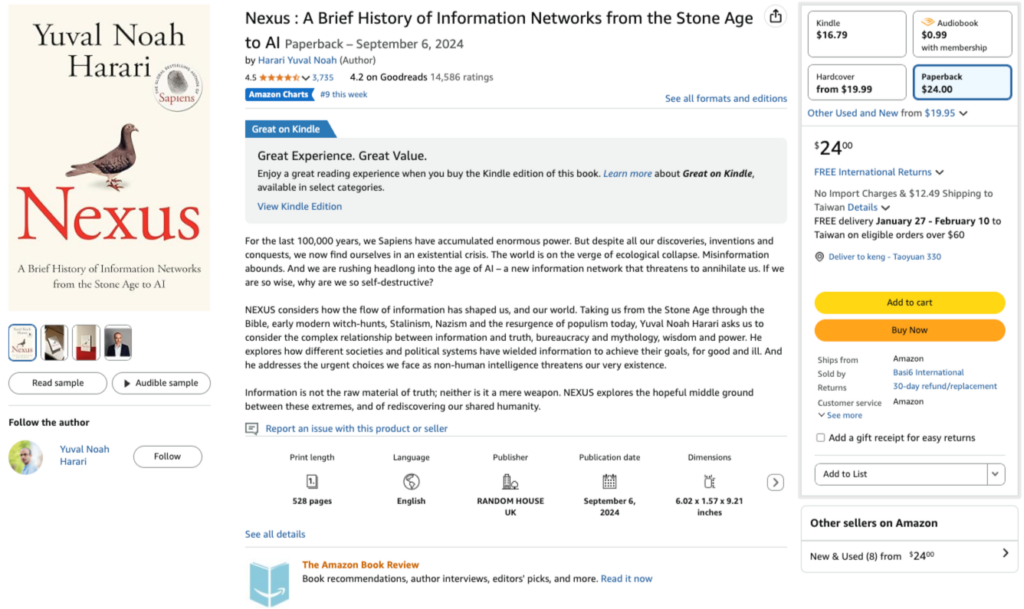
Yuval Noah Harari’s Nexus: A Brief History of Information Networks (2024) delves into the evolution of information networks from prehistoric times to the era of artificial intelligence (AI). Harari examines how these networks have shaped societies, redefined power structures, and now present new challenges in the age of AI.
Key Points from the Book
1. The Role of Information Networks
Harari argues that information is more than a tool for recording reality—it is the fabric that connects people, builds societies, and drives human progress. From oral traditions to religious scriptures, the printing press, and now digital algorithms, information networks have been central to societal development. However, they are not inherently benign; they can empower communities but also manipulate and control them.
2. Artificial Intelligence and Decision-Making
AI elevates information networks to an unprecedented level, enabling machines to process data, make decisions, and even generate content autonomously. Harari warns of the risks this poses, such as loss of human agency, invasion of privacy, and threats to democratic institutions. He raises concerns about the potential for AI to lead to a form of “digital totalitarianism,” where power is concentrated among those who control these technologies.
3. Democracy and Information Control
A functioning democracy depends on the free flow of accurate information and the public’s ability to self-correct. Harari suggests that AI could undermine these mechanisms by centralizing control of information and increasing susceptibility to propaganda and disinformation.
4. Human Identity in an AI-Driven World
As AI increasingly shapes our reality, humanity faces a crisis of identity and purpose. Harari emphasizes the need for a conscious effort to ensure that technology enhances human welfare rather than diminishes our autonomy and values.
Impacts on Digital Nomads
Digital nomads—professionals who leverage technology to work remotely and live flexibly—are particularly influenced by the themes Harari explores. Here are some key impacts:
1. Workforce Transformations
AI and automation are reshaping the job market, replacing some roles while creating new opportunities. Digital nomads need to stay adaptable, continuously upskill, and embrace emerging technologies to remain competitive.
2. Access to Information and Security Risks
As individuals heavily reliant on global information networks, digital nomads benefit from unprecedented access to resources and opportunities. However, the proliferation of misinformation and cybersecurity threats requires them to exercise caution and critically evaluate the sources of their information. They also need to invest in robust digital security measures to safeguard their data.
3. Social Connectivity and Isolation
Digital tools allow nomads to work from anywhere, but the transient lifestyle can lead to feelings of social isolation. While online networks facilitate professional and personal connections, digital nomads must actively balance virtual interactions with in-person relationships to maintain mental and emotional well-being.
4. Regulatory and Legal Considerations
Different countries have varied laws regarding digital work, taxation, and residency. Nomads must navigate these regulations carefully to avoid legal complications. Harari’s insights into centralized control and surveillance highlight the potential for governments to increase monitoring of remote workers.
Conclusion
Nexus provides a compelling exploration of how information networks have shaped human history and how their evolution in the AI era poses both opportunities and threats. For digital nomads—who depend on these networks for their livelihood and lifestyle—the book serves as a valuable guide to navigating the complexities of a world increasingly defined by AI-driven networks. To thrive, they must embrace adaptability, prioritize digital security, foster meaningful connections, and remain vigilant about the ethical implications of the technologies they use.

《Nexus:从石器时代到人工智能的信息网络简史》是尤瓦尔·诺亚·赫拉利于2024年出版的著作,探讨了信息网络在人类历史中的演变,以及它们如何塑造社会、影响权力动态,并在人工智能(AI)时代引发新的挑战。
书籍概要
赫拉利在书中提出,信息不仅仅是对现实的反映,更是连接人类、构建社会网络的纽带。从早期的口头传说、宗教文本,到印刷术的发明,再到现代的数字算法,信息网络一直在推动人类社会的发展。然而,信息并不总是等同于真理;它可以被用来传播虚假信息,操纵公众舆论,甚至维持专制政权。
在人工智能时代,信息网络的力量达到了前所未有的高度。AI不仅能够处理和传播信息,还能自主做出决策,创造新的内容。这引发了对人类自主性、隐私和民主制度的深刻担忧。赫拉利警告,如果不加以控制,AI可能会导致数字极权主义,甚至对人类文明构成生存威胁。
值得关注的观点
1. 信息的双重性:信息既可以促进合作与进步,也可能被用来操纵和控制社会。历史上,宗教文本、政治宣传等都曾被用来连接人们,但也可能传播虚假信息,导致冲突和压迫。
2. 人工智能的崛起:AI的自主决策能力使其不仅仅是工具,更像是主动的参与者。这带来了前所未有的挑战,包括潜在的失控风险和对人类价值观的冲击。
3. 民主与信息网络:民主制度依赖于信息的自由流动和自我纠正机制。然而,AI可能会集中信息控制,削弱民主的基础,甚至导致数字极权主义的出现。
4. 人类身份的重构:随着AI的发展,人类需要重新思考自身的身份和目的。我们必须确保技术的发展服务于人类的福祉,而非削弱我们的自主性和价值观。
对数字游民的影响
数字游民是依赖数字技术进行远程工作、生活方式灵活的人群。信息网络的演变对他们有着深远的影响:
• 工作方式的转变:AI和自动化可能取代某些职业,但也会创造新的机会。数字游民需要不断提升技能,以适应快速变化的工作环境。
• 信息获取与安全:数字游民依赖全球信息网络获取资源和机会。然而,信息过载和虚假信息的传播可能影响他们的决策。此外,数据隐私和网络安全也是他们需要关注的问题。
• 社会连接与孤立:尽管数字技术使远程工作成为可能,但也可能导致社会孤立。数字游民需要平衡线上和线下的社交活动,保持心理健康。
• 法律与监管环境:不同国家对数字工作的法律和税收政策各异。数字游民需要了解并遵守各地的法规,以避免法律纠纷。
总的来说,赫拉利在《Nexus》中强调了信息网络在塑造人类社会中的关键作用,特别是在AI时代的挑战和机遇。数字游民作为高度依赖信息网络的群体,需要特别关注这些变化,积极适应,以在快速发展的数字时代中保持竞争力和福祉。

Leave a Reply